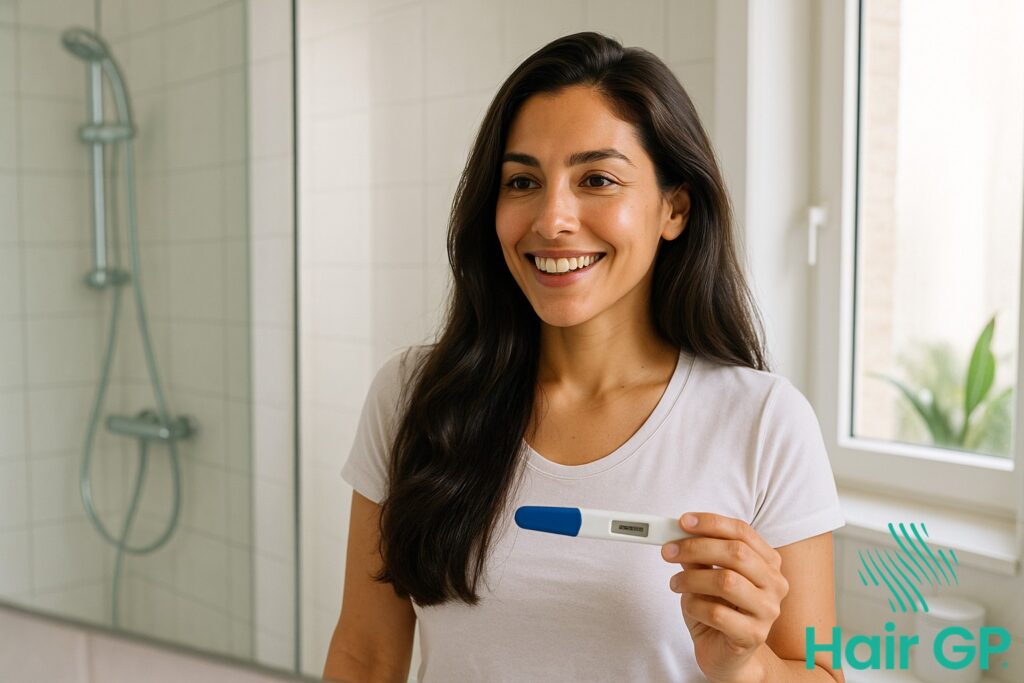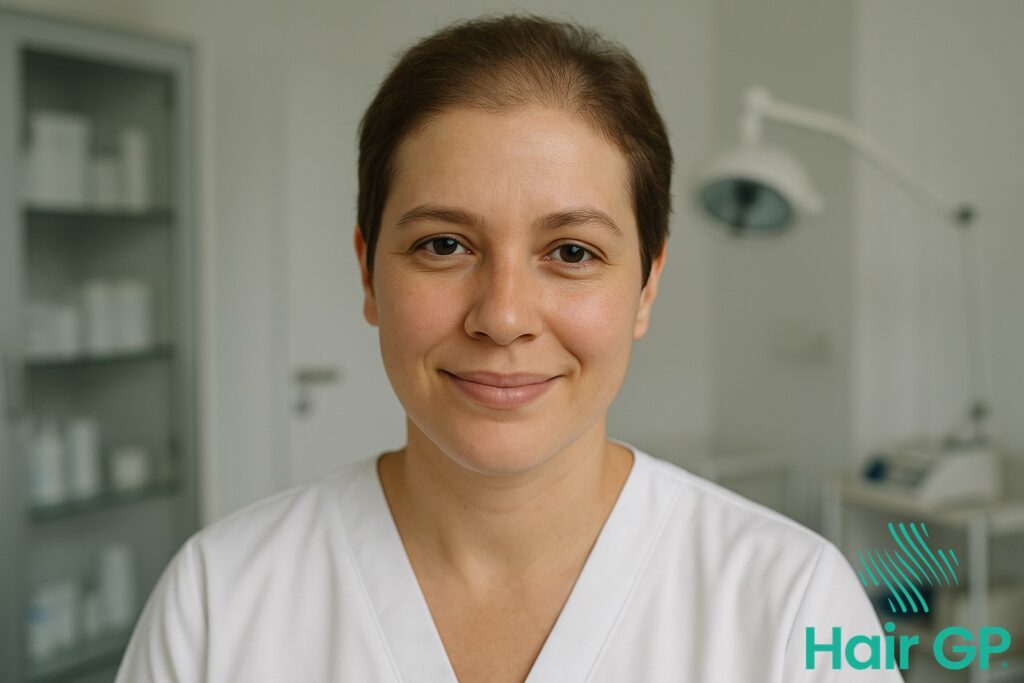Introduction
Experiencing hair loss during IVF treatment can be an unexpected and distressing aspect of your fertility journey. Whilst in vitro fertilisation offers hope for parenthood, many individuals notice changes in their hair health throughout the process. This temporary condition affects numerous patients undergoing fertility treatments, yet it remains a lesser-discussed side effect that deserves attention and understanding.
The connection between IVF and hair thinning stems from multiple factors working simultaneously. Hormonal changes triggered by fertility medications, the physical demands of ovarian stimulation, and the emotional stress of treatment all contribute to disrupting your hair’s normal growth patterns. This article explores the biological mechanisms behind treatment-related hair changes, examines how different fertility protocols impact hair follicles, and addresses the psychological factors that compound these physical effects. Most importantly, you’ll discover practical strategies for managing hair loss, recognising different patterns of thinning, and supporting healthy regrowth whilst maintaining your fertility treatment outcomes.
Key Takeaways – TL/DR
- Hair loss during IVF is typically temporary and affects 40-50% of women undergoing fertility treatments
- Hormonal fluctuations from fertility medications are the primary cause, often triggering telogen effluvium
- Most women experience complete hair regrowth within 3-6 months after IVF completion
- Stress management and proper nutrition can minimize hair loss severity during treatment
- Consulting both your fertility specialist and dermatologist ensures comprehensive care
Understanding the IVF-Hair Loss Connection
The biological relationship between assisted reproductive technology and hair thinning involves complex hormonal mechanisms that directly impact hair follicles. Research indicates that approximately 20-30% of women undergoing IVF experience some degree of hair loss during or after treatment . This phenomenon primarily results from the dramatic hormonal fluctuations induced by fertility medications, which disrupt the normal hair growth cycle.
During IVF treatment, ovarian stimulation creates significant hormonal influences that can trigger telogen effluvium, a condition where hair follicles prematurely enter the resting phase. This mechanism occurs when physical or emotional stress causes follicles to synchronously shift from the active growth phase (anagen) to the telogen phase, resulting in increased shedding approximately two to three months later [1]. The high doses of gonadotropins used in fertility protocols can amplify these effects, whilst rapid oestrogen fluctuations following egg retrieval further destabilise follicular cycling.
Additionally, fertility medications such as GnRH agonists and antagonists can directly influence hair follicle metabolism and growth patterns. The stress response associated with assisted reproductive technology procedures compounds these physiological changes, creating multiple pathways through which temporary hair loss may manifest during treatment cycles.
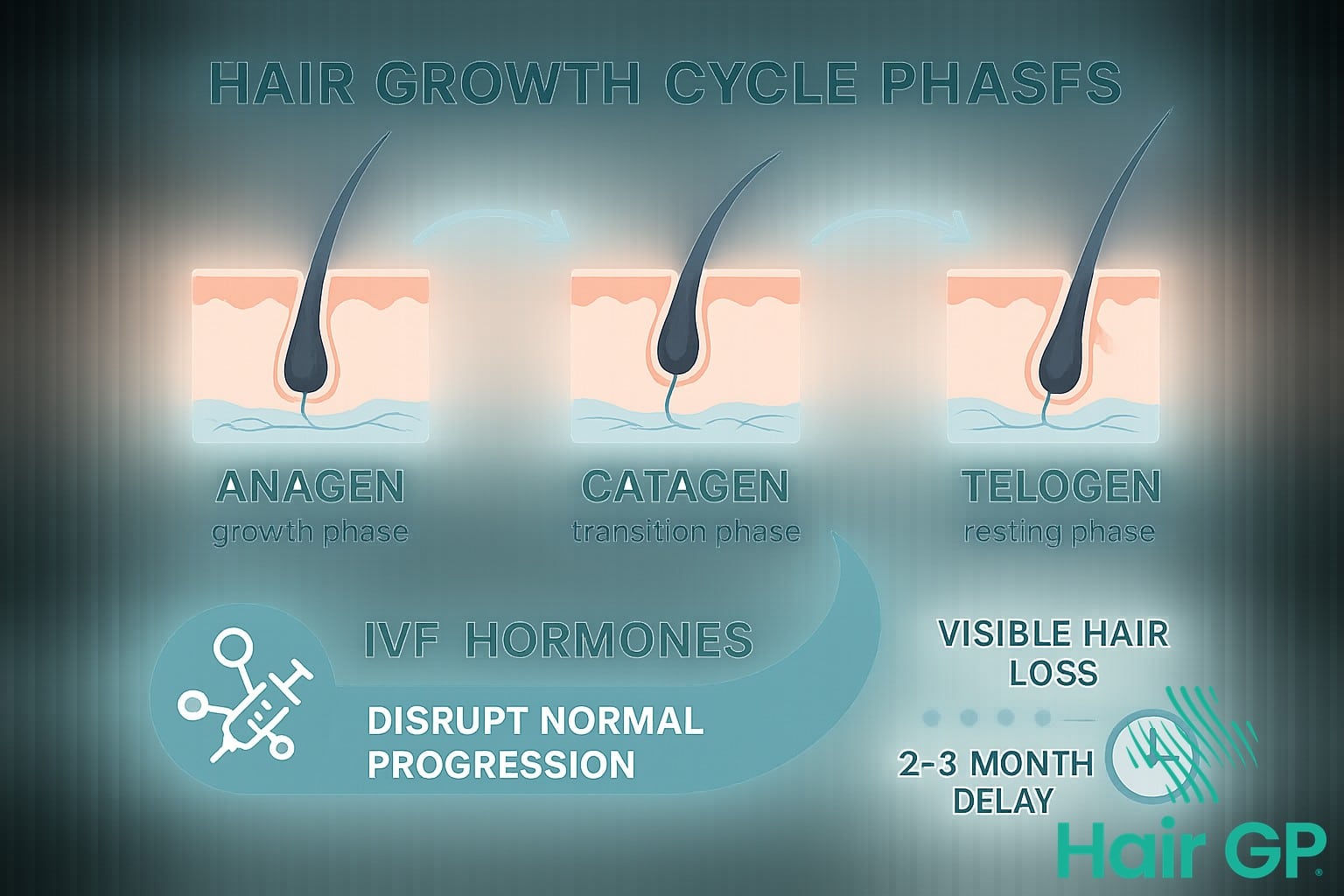
Hormonal Changes During IVF Treatment
The complex hormonal landscape during IVF protocols creates significant fluctuations that directly impact hair follicle function. Ovarian stimulation medications, combined with dramatic shifts in hormone levels throughout treatment cycles, can trigger temporary hair loss through multiple pathways affecting follicular metabolism and growth phases.
Fertility Medications and Hair Follicles
Clomid (clomiphene citrate) acts as a selective oestrogen receptor modulator, blocking oestrogen’s protective effects on hair follicles [2]. This anti-oestrogenic action disrupts normal follicular cycling, potentially accelerating telogen effluvium. Gonadotropin stimulation during ovulation induction creates supraphysiological hormone levels, whilst progesterone supplementation following embryo transfer can prolong the telogen phase, leading to increased shedding.
Oestrogen and Progesterone Fluctuations
During ovarian stimulation, oestrogen levels can rise ten-fold above normal physiological ranges, followed by rapid withdrawal after egg retrieval. This dramatic fluctuation disrupts the hair growth cycle, as oestrogen typically prolongs the anagen (growth) phase. Progesterone elevation during the luteal support phase creates hormonal imbalances that may trigger premature follicular transition to telogen phase [3].
The Role of Stress Hormones
Cortisol levels significantly increase during IVF protocols, with studies showing elevations of 20-30% above baseline during stimulation cycles. This stress hormone elevation interferes with hair follicle metabolism and compounds medication-induced effects. The interaction between elevated cortisol and fertility drugs like letrozole creates a synergistic impact on follicular disruption, potentially extending the duration and severity of treatment-related hair loss.
Stress and Its Impact on Hair Health During IVF
The emotional demands of the IVF journey create psychological stress that significantly impacts hair health beyond the physical hormonal effects. Understanding this mind-body connection helps women undergoing fertility treatments adopt a more holistic approach to managing treatment-related hair changes.
The Mind-Body Connection
Psychological stress triggers a cascade of stress hormones, particularly cortisol, which disrupts normal hair growth cycles. This hormonal surge interferes with nutrient absorption in the digestive system, depriving hair follicles of essential vitamins and minerals needed for healthy growth. Sleep disruption, common during the fertility journey, further compounds these effects by interrupting the body’s natural repair processes that occur during rest, potentially accelerating hair thinning and loss.
Stress Management Strategies
Implementing practical stress-reduction techniques can significantly minimise hair loss during treatment. Daily meditation and mindfulness practices, even for just ten minutes, help regulate cortisol levels and promote overall wellbeing. Gentle exercise like yoga or walking boosts circulation to the scalp whilst releasing endorphins that counteract stress hormones. Joining support groups specifically for fertility patients provides emotional relief through shared experiences, reducing isolation and creating a supportive environment that benefits both mental health and physical symptoms including hair preservation.
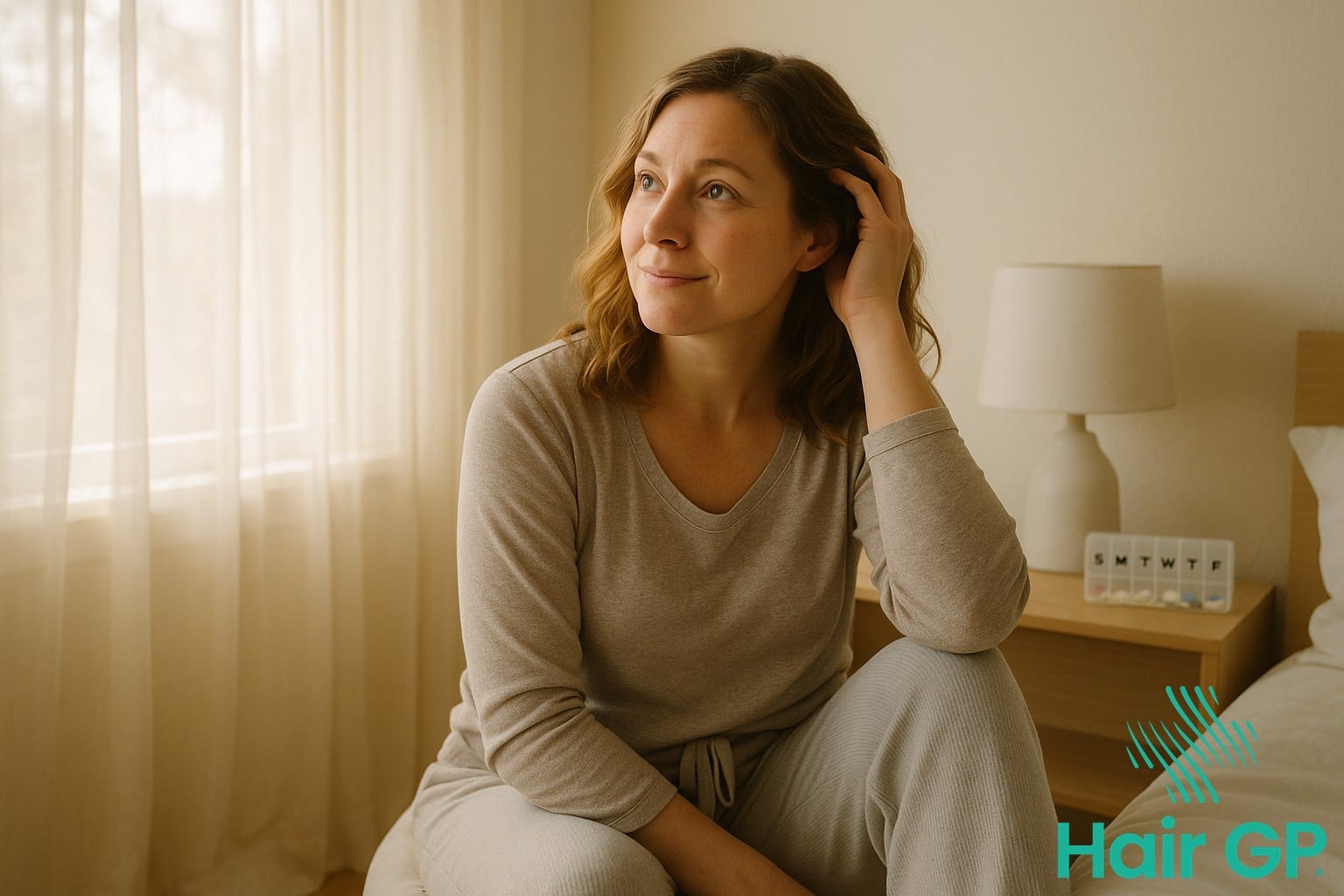
Common Types of Hair Loss During IVF
Women undergoing IVF commonly experience various hair loss patterns, with telogen effluvium affecting approximately 26-33% of patients during treatment cycles [4]. Understanding these patterns helps distinguish between normal treatment-related shedding and conditions requiring medical intervention.
Telogen Effluvium: The Most Common Pattern
Telogen effluvium represents the predominant form of temporary hair loss during IVF, characterised by diffuse thinning hair across the scalp. Hair follicles prematurely enter the resting phase, causing increased shedding typically beginning 2-3 months after hormonal disruption [2]. This delayed onset often coincides with early pregnancy or post-retrieval periods, creating additional anxiety for patients already managing treatment stress.
PCOS-Related Hair Changes
Women with polycystic ovary syndrome face unique challenges, as fertility medications may exacerbate pre-existing androgenic alopecia patterns. The interaction between elevated androgens and ovarian stimulation drugs can accelerate hair thinning, particularly at the crown and parting areas. Management strategies include anti-androgen treatments and specialised scalp care routines.
When to Seek Additional Help
Whilst temporary hair loss is expected, certain symptoms warrant dermatological consultation. Patchy hair loss, scalp inflammation, or shedding persisting beyond six months requires evaluation. Excessive daily hair loss exceeding 150 strands or visible scalp changes necessitate prompt medical assessment.
Recovery Timeline and Hair Regrowth Strategies
Understanding the hair regrowth timeline following IVF treatment helps manage expectations whilst implementing effective recovery strategies. With proper nutritional support and gentle care approaches, most women experience complete hair recovery within twelve months, maintaining positive fertility outcomes throughout the process.
Expected Recovery Timeline
Hair recovery follows a predictable pattern after IVF completion. The initial three-month stabilisation period sees reduced shedding as hormone levels normalise. Visible hair growth typically emerges at six months, with baby hairs appearing along the hairline. Complete recovery, achieving pre-treatment density, generally occurs within twelve months for most women experiencing IVF success.
Nutritional Support for Hair Recovery
Essential nutrients accelerate hair health restoration. Adequate iron levels prevent secondary deficiencies. Protein intake of 1g per kilogram body weight supports keratin production. Omega-3 fatty acids (1000mg daily) reduce inflammation and promote healthy scalp circulation.
Safe Topical Treatments
Minoxidil 5% solution proves effective for post-IVF hair loss when pregnancy isn’t immediately planned. This must not be used if you become pregnant. Daily scalp massage stimulates blood flow without affecting fertility and pregnancy outcomes. Gentle sulphate-free shampoos prevent additional stress to recovering follicles.
Lifestyle Modifications
Quality sleep (7-9 hours) optimises growth hormone production essential for hair regrowth. Regular moderate exercise improves circulation whilst managing stress through yoga or meditation supports both hair recovery and ongoing fertility goals.
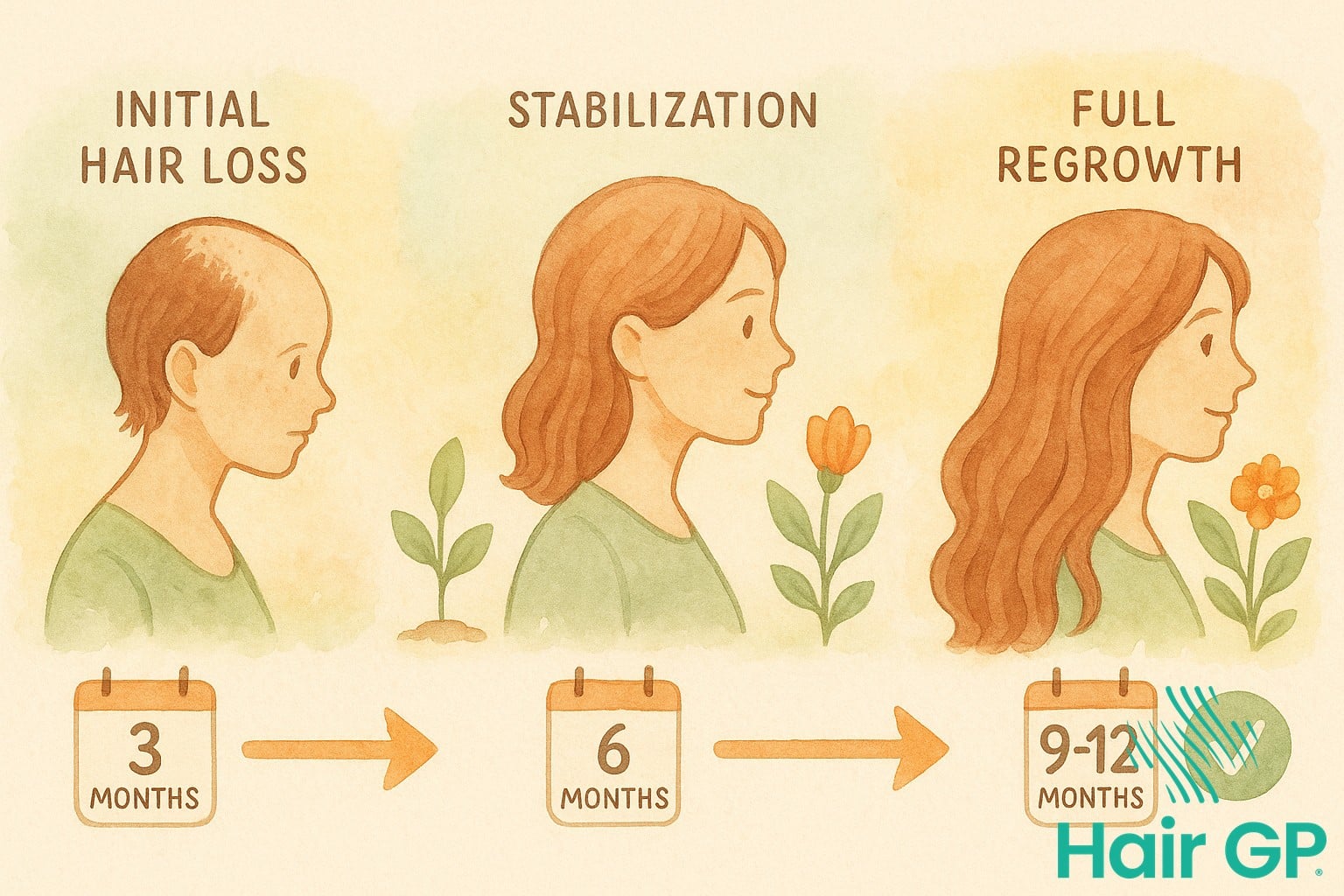
Conclusion
Understanding that hair loss during your IVF journey is typically temporary can provide significant reassurance during an already challenging time. Most women experience complete hair regrowth within three to six months following treatment completion, as hormonal levels naturally stabilise and the body recovers from the stress of fertility procedures.
Adopting a holistic approach to managing both your fertility journey and hair health proves most effective. This involves maintaining open communication with your fertility specialist about any concerns, implementing supportive nutritional strategies, and practising stress-reduction techniques that benefit both reproductive and follicular health.
Remember that experiencing temporary hair changes does not diminish your strength or beauty during this transformative period. By combining medical guidance with gentle self-care practices, you can navigate both fertility treatments and hair loss concerns with confidence. Your body’s remarkable ability to heal and regenerate extends to hair regrowth, offering hope that this aspect of your IVF journey will resolve with time and proper care.
Frequently Asked Questions
Yes, in most cases hair loss during IVF is temporary. The majority of women experience complete hair regrowth within 3-6 months after treatment completion, though full density may take up to 12 months to return.
Consult your fertility specialist before using minoxidil during active IVF treatment.
No, hair loss is not indicative of IVF success or failure. It’s a common side effect of hormonal changes and stress that affects many women regardless of treatment outcome.
Not necessarily. Discuss your concerns with your fertility specialist who can assess whether your current hair loss might be related to an underlying condition that needs addressing before proceeding with treatment.
Prenatal vitamins, iron (if deficient), and omega-3 fatty acids are generally safe. Always clear any supplements with your fertility team to ensure they won’t interfere with your IVF protocol.
References
- Asghar F, Shamim N, Farooque U, Sheikh H, Aqeel R. Telogen Effluvium: A Review of the Literature. Cureus. 2020. PMID: 32607303
- Mysore V, Parthasaradhi A, Kharkar RD, Ghoshal AK, Ganjoo A, Ravichandran G et al.. Expert consensus on the management of Telogen Effluvium in India. Int J Trichology. 2019. PMID: 31360038
- Grymowicz M, Rudnicka E, Podfigurna A, Napierala P, Smolarczyk R, Smolarczyk K et al.. Hormonal Effects on Hair Follicles. Int J Mol Sci. 2020. PMID: 32731328

